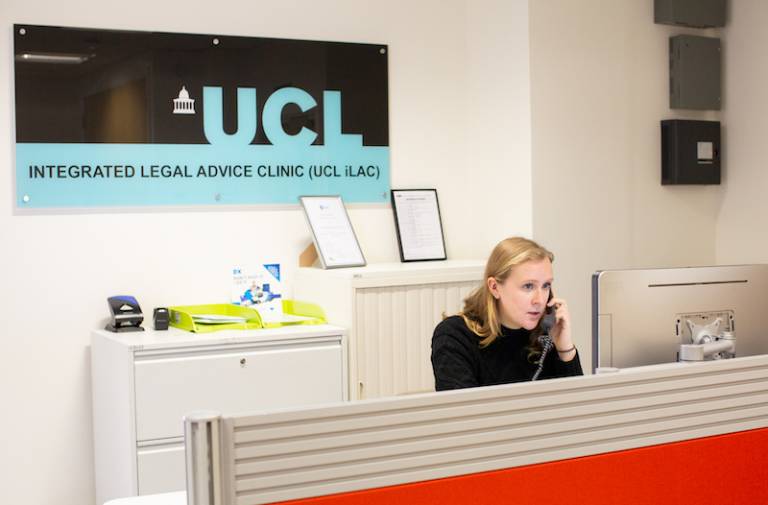Help us to raise vital funds to support the UCL Centre for Access to Justice
19 December 2019

UCL’s Centre for Access to Justice has been supported by philanthropy since it was founded in 2013. As we look towards the future, we recognise the vital role it will play in building our capacity to match the growing demands for our services from both students and community members in need. To ensure we can keep up with this demand, and continue to grow our activities we need your help to raise £100,000.
Martin Rushton-Turner, UCL Faculty of Laws alumni and long term supporter of UCL, has generously donated £50,000, getting us half way to our target. Professor Piet Eeckhout, Dean of the UCL Faculty of Laws, has committed to providing £25,000 of Faculty of fund towards this target, leaving us with a total of £25,000 to raise. We are now looking to you, our alumni, Faculty friends and dedicated supporters, to consider making a donation of any size to support our important work.
"I had serious anxiety. I had done everything in my power. I gave all the evidence I knew my situation wasn't good and my heath was deteriorating. I wanted to give up but I couldn't, my son needed space because of his condition. UCL saved us. It was impossible without UCL. As a single mother working very hard. I don't think I could have carried on without the support I received." - UCL Integrated Advice Clinic (UCL iLAC) client
The UCL Centre for Access to Justice, based at UCL Laws, combines high quality legal education with the provision of pro bono advice and representation to vulnerable communities who would otherwise be unable to afford it. Since its establishment, philanthropy has consistently supported some of the Centre’s most ambitious projects and pro bono activities: instilling in our students a deeper appreciation for access to justice, fostering a commitment to public interest and enabling them to put their legal education into practice in the context of the wider world.
With the establishment of our free specialist legal advice clinic in the heart of East London and partnerships with leading advocacy organisation, we have created unique opportunities to enhance student’s learning as well as supporting those who need it most. In doing so, we are helping to shape current debates on access to justice issues, making real impact on our local community and producing highly capable and socially-conscious UCL Laws’ graduates.
“I knew that I was studying law in order to give back to those who struggle to find a voice within the legal system, but I was struggling to work out how to turn this passion into a career. It was in fact pro bono opportunities, provided by UCL and outside, that kept me grounded and reminded me that studying Law is a rewarding way to give back to the community while simultaneously enriching yourself as a student.”- UCL Laws Student
Join the community of like-minded philanthropists, taking collective action to protect and promote access to justice. Your donation will help us continue making access to justice a priority and create positive changes in the lives of our students and community members now and into the future.
To find out more about how you can support the UCL Centre for Access to Justice, click the button below.
Case study:
Mrs Z experiences severe and longstanding mental health problems. She approached the Clinic after her benefits appeal had been adjourned for a second time.
Mrs Z’s appeal related to a two year old decision; the DWP had found that she was unfit for work, but had not placed her in the “Support Group” for Employment and Support Allowance. This meant that Mrs K was entitled to less money, but more importantly, her benefit was conditional on her taking part in “work-related activities”. These activities had a hugely negative impact on Mrs Z’s mental wellbeing—so much so that, in the months prior to her final hearing taking place, she was sectioned under the Mental Health Act.
We helped Mrs Z to prepare her submissions, sorted through hundreds of pages of medical evidence, and represented her at her hearing. The Judge agreed that there would be a substantial risk to Mrs Z’s health if she was not placed in the Support Group, and her appeal was allowed.
Mrs Z and her family were relieved for such a drawn out process to have finally concluded, and thankful for the help they had received from the Clinic staff.
Unfortunately, this is only a temporary reprieve. Like the vast majority of ESA claimants who have chronic health conditions, Mrs Z will have to undergo regular reassessments in order to remain entitled to her benefit
 Close
Close

